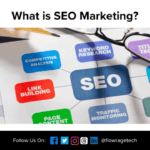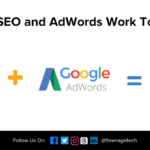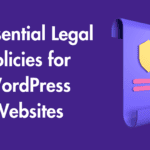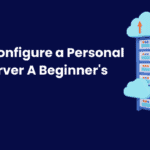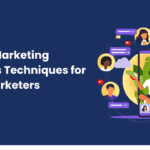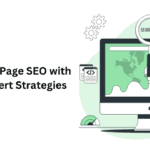In today’s digital landscape, having a strong online presence is crucial for businesses to succeed. And at the heart of a successful online presence is a well-optimized website. Search engine optimization (SEO) plays a vital role in driving traffic and improving visibility on search engines. While there are various aspects to SEO, mastering on-page optimization is essential for website success. In this article, we will delve into expert strategies that will help you master on-page SEO and make your website rank higher in search engine results. Whether you are a business owner or a digital marketer, these strategies will guide you towards website success.

The importance of on-page SEO
On-page SEO is the foundation of any successful SEO campaign. It involves optimizing various elements on your web page to make it more attractive to search engines. By incorporating relevant keywords, optimizing meta tags, and structuring your content effectively, you can improve your website’s visibility on search engine results pages (SERPs).
One of the key benefits of on-page SEO is that it helps search engines understand the context and relevance of your content. This, in turn, increases your chances of ranking higher for relevant search queries. Additionally, a well-optimized website enhances the user experience, making it easier for visitors to navigate and find the information they are looking for.
Also Read: The Ultimate Guide To Boost Your Website’s Rankings Like a Pro With SEO
Ultimately, on-page SEO is all about making it easier for search engines and users to find, understand, and navigate your website. By implementing expert strategies for on-page optimization, you can significantly improve your chances of ranking higher in search engine results pages and driving more organic traffic to your website.
Understanding the key elements of on-page SEO
In order to master on-page SEO, it is important to understand the key elements involved in optimizing your web page. These elements play a crucial role in improving your website’s visibility and attracting organic traffic.
Firstly, keyword research is an essential step in on-page SEO. By identifying relevant keywords that are frequently searched by users, you can strategically incorporate them into your content, title tags, headings, and meta descriptions. This helps search engines understand the topic of your webpage and rank it accordingly.
Secondly, optimizing your meta tags is crucial. Title tags and meta descriptions are the first things that users see on search engine results pages (SERPs). Writing compelling and relevant meta tags can entice users to click on your webpage, increasing organic traffic.
Lastly, the structure and organization of your content play a vital role in on-page optimization. Utilizing proper header tags (H1, H2, etc.), creating a logical flow of information, and using bullet points and subheadings can make your content more user-friendly and help search engines understand the structure of your webpage.
By understanding and implementing these key elements, you can take your on-page SEO to the next level and achieve better visibility in search engine results pages. Stay tuned for our next blog section, where we will delve deeper into these strategies and provide specific tips and techniques to optimize each element effectively.
Crafting compelling meta tags and descriptions
Crafting compelling meta tags and descriptions is an important aspect of mastering on-page SEO. Meta tags and descriptions are the first impression that users get of your webpage on search engine results pages (SERPs). Therefore, it is crucial to make them compelling and relevant to entice users to click on your link.
When crafting your meta tags, make sure to include relevant keywords that accurately represent the content of your webpage. This helps search engines understand the topic of your page and rank it accordingly. Use action-oriented language and include a call-to-action to encourage users to click on your link.
Similarly, your meta description should succinctly summarize the content of your webpage and highlight its value to the users. Make it engaging and informative, so that users are intrigued to learn more by visiting your website.
In the next blog section, we will provide specific tips and techniques to optimize your meta tags and descriptions effectively. Stay tuned to enhance your on-page SEO game and attract more organic traffic to your website.
Optimizing your website’s URL structure
Optimizing your website’s URL structure is another crucial aspect of mastering on-page SEO. The URL structure not only provides valuable information to search engines but also plays a role in improving user experience.
To optimize your URL structure, make sure to keep it concise, relevant, and keyword-rich. Avoid using long, convoluted URLs that are difficult for both search engines and users to understand. Instead, aim for short, descriptive URLs that accurately reflect the content of the page.
Including keywords in your URLs can help search engines determine the relevancy of your content. For example, if you have a webpage about “best healthy recipes,” a URL like “www.yourwebsite.com/best-healthy-recipes” is more effective than a generic URL like “www.yourwebsite.com/page1234.”
In addition, use hyphens to separate words in your URLs as search engines consider these separators as word delimiters. This makes it easier for search engines to interpret the meaning of each word in your URL.
By optimizing your website’s URL structure, you create a more user-friendly experience and improve the overall visibility of your webpages in search engine results. Stay tuned for the next blog section where we will explore additional expert strategies to boost your on-page SEO game.
Utilizing keyword research for on-page optimization
Utilizing keyword research is a crucial step in optimizing your on-page SEO. By conducting thorough keyword research, you can identify the specific search terms and phrases that your target audience is using to find content related to your website.
Start by brainstorming a list of relevant topics and themes that align with your website’s content. From there, use tools like Google Keyword Planner or SEMrush to find specific keywords that have high search volume and low competition.
When incorporating these keywords into your on-page optimization, make sure to include them in strategic locations such as the page title, meta description, headings, and throughout the body of your content. However, it’s essential to use keywords naturally and avoid keyword stuffing, as this can negatively impact both user experience and search engine rankings.
By utilizing keyword research, you can optimize your on-page SEO efforts and improve your website’s visibility in search engine results. In the next blog section, we will explore additional expert strategies to further enhance your on-page optimization game.
Creating high-quality, relevant and engaging content
Creating high-quality, relevant, and engaging content is at the core of effective on-page SEO. Your content should provide value to your audience, addressing their needs and answering their questions. When crafting your content, consider the following tips:
1. Focus on your target audience: Understand their demographics, interests, and pain points. Tailor your content to resonate with them and provide solutions to their problems.
2. Conduct in-depth research: Thoroughly research your chosen topic to ensure you have the most up-to-date and accurate information. Use reputable sources and cite them properly.
3. Structure your content: Organize your content using clear headings, subheadings, and bullet points. This helps both readers and search engines understand the hierarchy and flow of your content.
4. Use visuals: Incorporate relevant images, videos, and infographics to make your content visually appealing and easier to understand.
5. Optimize for readability: Use short sentences, paragraphs, and simple language. Break up your content into easily digestible chunks to enhance readability.
Remember, creating high-quality content not only improves your on-page SEO but also increases engagement, drives traffic, and establishes you as an authority in your niche. Stay tuned for additional expert strategies in the next blog section.
Optimizing your website’s images for better SEO
In addition to creating high-quality content, optimizing your website’s images is crucial for improving your on-page SEO. Images not only enhance the visual appeal of your content but also provide an opportunity to optimize them for search engines. Here are some expert strategies to optimize your images:
1. Choose the right file format: Use JPEG or PNG file formats for your images depending on the type and quality required. Compress your images without compromising their visual quality to reduce their file size.
2. Optimize image alt text: Alt text helps search engines understand what your image is about. Use relevant and descriptive keywords in your alt text to improve your SEO.
3. Use descriptive file names: Rename your image files with descriptive keywords before uploading them to your website. This can help search engines index your images better.
4. Resize your images: Use the appropriate image dimensions to ensure fast loading times. Large images can significantly slow down your website, leading to a poor user experience and lower search engine rankings.
By implementing these image optimization strategies, you can improve your on-page SEO, increase your website’s loading speed, and enhance your user experience. Stay tuned for more expert strategies in the next section to master on-page SEO!
Implementing internal linking strategies
In addition to optimizing your images, another crucial aspect of on-page SEO is implementing effective internal linking strategies. Internal linking involves connecting pages within your website by adding hyperlinks from one page to another. This not only helps users navigate through your website easily but also signals to search engines the importance and relevance of specific pages.
To effectively implement internal linking, consider the following strategies:
1. Incorporate relevant anchor text: When adding internal links, use descriptive anchor text that clearly indicates what the linked page is about. Avoid using generic terms like “click here” or “read more” as they provide little context for search engines.
2. Prioritize deep linking: It’s important to link to various pages throughout your website, not just the homepage. Deep linking helps distribute authority evenly and gives search engines a better understanding of your website’s structure.
3. Create a logical hierarchy: Organize your content into clearly defined categories and subcategories. Link related pages together in a hierarchy that makes sense to both users and search engines.
4. Regularly review and update internal links: As your website evolves, some internal links may become outdated or ineffective. Periodically review your content and update internal links to ensure they remain relevant and useful.
By implementing these internal linking strategies, you can enhance the organization and accessibility of your website, improve user experience, and boost your on-page SEO efforts. Stay tuned for more expert strategies in the next section to further master on-page SEO!
Regularly monitoring and updating your on-page SEO efforts
Once you have implemented effective internal linking strategies, the next crucial step in mastering on-page SEO is to regularly monitor and update your efforts. SEO is not a one-time task but an ongoing process. As your website content and search engine algorithms evolve, it is important to stay up to date and make necessary adjustments to maintain your ranking and visibility.
To effectively monitor and update your on-page SEO, consider the following strategies:
1. Analyze website analytics: Regularly analyze your website’s analytics to track the performance of your pages, including organic traffic, bounce rate, and time on page. This will help you identify any underperforming pages that may require optimization.
2. Conduct keyword research: Keywords are the foundation of on-page SEO. Regularly conduct keyword research to identify new opportunities and ensure your content aligns with the search intent of your target audience.
3. Update meta tags: Review and update your meta titles and meta descriptions to ensure they accurately reflect the content of your pages and are optimized for search engines.
4. Optimize page content: Continuously optimize your page content by incorporating relevant keywords, heading tags, and engaging multimedia elements. Regularly update your content to keep it fresh and relevant.
By regularly monitoring and updating your on-page SEO efforts, you can stay ahead of your competition, adapt to changes in search engine algorithms, and improve your website’s visibility and rankings. In the next section, we will delve into the importance of optimizing your website’s loading speed. Stay tuned!
Mastering on-page SEO for long-term success.
In conclusion, mastering on-page SEO is essential for long-term success in improving your website’s visibility and rankings. By implementing effective internal linking strategies, regularly monitoring and updating your efforts, and optimizing your page content, you can stay ahead of your competition and adapt to changes in search engine algorithms. However, optimizing your website’s loading speed is another crucial aspect of on-page SEO that should not be overlooked. In the next section, we will dive into the impact of loading speed on user experience and search engine rankings, as well as provide expert strategies to optimize your website’s loading time. Stay tuned to learn more about this important aspect of on-page SEO.

